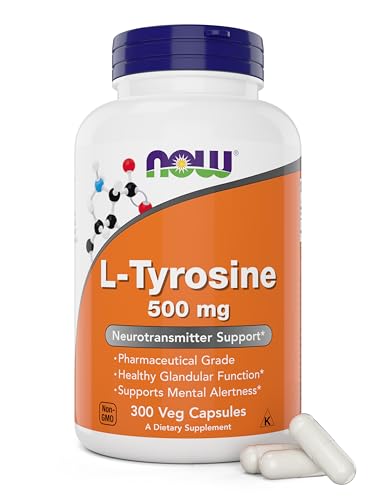
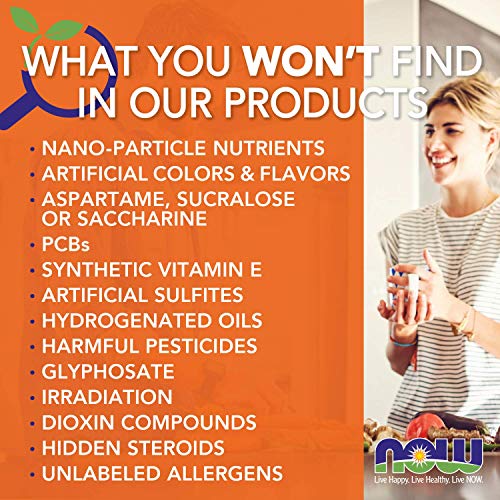
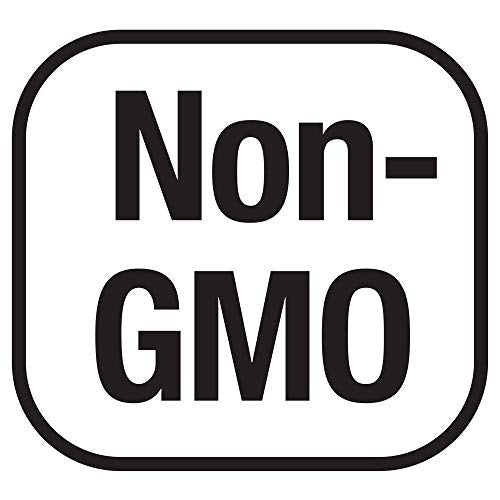
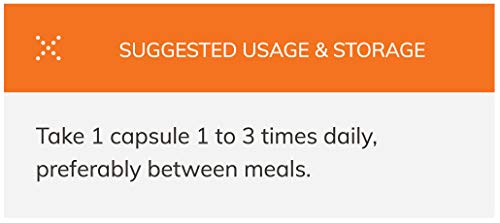
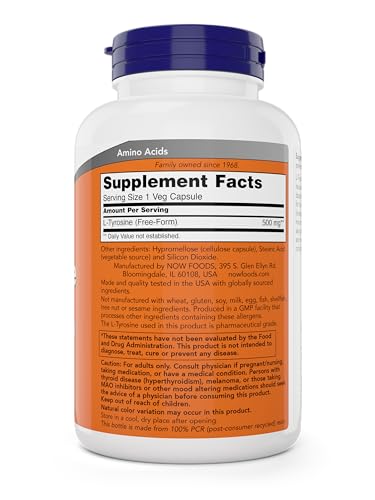
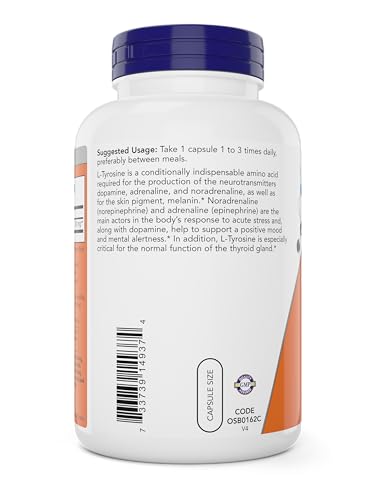

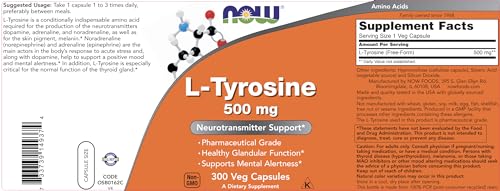
Now Foods L-Tyrosine 500mg - Supports Mental Alertness, Non-GMO, 300 Capsules


Triticum Vulgare (Wheat) Gluten
Medium RiskTriticum vulgare (wheat) gluten is a protein derived from wheat that functions primarily as a binding agent in various food and cosmetic products. It provides texture and elasticity, making it a common ingredient in baked goods and some personal care items.
Sustai Insights
Wheat gluten offers functional benefits such as enhancing product texture and acting as a stabilizer. However, it poses moderate allergenic risks, particularly for individuals with gluten sensitivity or celiac disease. Environmental concerns are low, with no significant pollutant potential noted. Regulatory bodies do not impose major restrictions, but products must be clearly labeled for consumer safety. Overall, the risk level is assessed as medium. Safe usage practices should be observed, especially for sensitive populations, and alternatives like pea protein or other plant-based binders may be considered.
Egg
Low RiskEgg is the entire content of chicken eggs, commonly used as an ingredient in various products for its nutritional and functional properties.
Sustai Insights
Eggs are known for their functional benefits, including serving as a binding agent and providing protein. They are typically sustainably sourced and biodegradable. Health risks are considered low, with minimal concerns regarding carcinogenicity, allergies, or reproductive toxicity. Environmental risks are also low, with no significant pollutant potential. Regulatory bodies do not impose current restrictions on egg usage. Overall, the risk level is low, and safe usage practices should be observed, though alternatives like plant-based substitutes may be considered for those with allergies.
Sesamum Indicum (Sesame) Oil
Low RiskSesamum indicum (sesame) oil is derived from the seeds of the sesame plant. It is commonly used in cosmetic formulations due to its emollient properties and ability to nourish the skin. This oil is rich in fatty acids and antioxidants, contributing to its effectiveness in various skincare products.
Sustai Insights
Sesame oil offers several functional benefits, including moisturization and nourishment for the skin, along with potential antioxidant properties. It is generally regarded as safe, with low concerns regarding carcinogenicity, allergies, and reproductive toxicity. Environmental risks are minimal, and the oil is not known to be bioaccumulative. Regulatory bodies do not impose significant restrictions on its use. Overall, sesame oil poses a low risk, making it a viable ingredient in cosmetic formulations, although consumers should consider potential allergies and choose responsibly sourced products.
Stearic Acid
Low RiskStearic acid is a naturally occurring fatty acid commonly found in animal and vegetable fats. It functions primarily as an emulsifier, thickener, and stabilizer in cosmetic and personal care products, providing texture and consistency.
Sustai Insights
Stearic acid offers functional benefits such as effective emulsification and stabilization of formulations. It is derived from renewable sources and is biodegradable, contributing to its sustainability profile. Health risks are low, with minimal concerns regarding carcinogenicity, allergies, or reproductive toxicity. Environmental risks are also low, with no significant pollutants or bioaccumulation concerns noted. Regulatory bodies, including the FDA, do not impose restrictions on its use. Overall, stearic acid is assessed as low risk, and its safe usage practices are well-established, with no significant alternatives needed.
Milk
Low RiskMilk is whole milk from cows, primarily used as a source of nutrition and an ingredient in various food products. It contains proteins, fats, carbohydrates, vitamins, and minerals, contributing to its functional benefits in culinary applications.
Sustai Insights
Milk provides essential nutrients and serves as a versatile ingredient in food, enhancing flavor, texture, and nutritional value. It is generally regarded as safe with low concerns for carcinogenicity, allergies, or developmental toxicity. Environmental risks are minimal, and regulatory bodies impose no significant warnings. However, individuals with lactose intolerance or dairy allergies should exercise caution. Overall, milk is assessed as low risk based on current scientific consensus.
Hydroxymethylcellulose
Low RiskHydroxymethylcellulose is a synthetic polymer derived from cellulose, primarily used as a thickening agent, emulsifier, and film-forming agent in various personal care and cosmetic products. It enhances texture, stability, and moisture retention, making it suitable for use in creams, lotions, and gels.
Sustai Insights
Hydroxymethylcellulose serves effectively as a thickener and stabilizer, contributing to product texture and moisture retention. It is considered low risk for health concerns such as carcinogenicity, allergies, and reproductive toxicity. Environmentally, it is not classified as a pollutant or bioaccumulative, aligning with regulatory standards in multiple regions. Overall, its risk level is assessed as low, with no significant adverse effects reported. Safe usage practices should be followed, and while alternatives exist, hydroxymethylcellulose remains a suitable choice in formulations.
Egg
Low RiskEgg is the entire content of chicken eggs, commonly used as an ingredient in various products for its nutritional and functional properties.
Sustai Insights
Eggs are known for their functional benefits, including serving as a binding agent and providing protein. They are typically sustainably sourced and biodegradable. Health risks are considered low, with minimal concerns regarding carcinogenicity, allergies, or reproductive toxicity. Environmental risks are also low, with no significant pollutant potential. Regulatory bodies do not impose current restrictions on egg usage. Overall, the risk level is low, and safe usage practices should be observed, though alternatives like plant-based substitutes may be considered for those with allergies.
Sesamum Indicum (Sesame) Oil
Low RiskSesamum indicum (sesame) oil is derived from the seeds of the sesame plant. It is commonly used in cosmetic formulations due to its emollient properties and ability to nourish the skin. This oil is rich in fatty acids and antioxidants, contributing to its effectiveness in various skincare products.
Sustai Insights
Sesame oil offers several functional benefits, including moisturization and nourishment for the skin, along with potential antioxidant properties. It is generally regarded as safe, with low concerns regarding carcinogenicity, allergies, and reproductive toxicity. Environmental risks are minimal, and the oil is not known to be bioaccumulative. Regulatory bodies do not impose significant restrictions on its use. Overall, sesame oil poses a low risk, making it a viable ingredient in cosmetic formulations, although consumers should consider potential allergies and choose responsibly sourced products.
Stearic Acid
Low RiskStearic acid is a naturally occurring fatty acid commonly found in animal and vegetable fats. It functions primarily as an emulsifier, thickener, and stabilizer in cosmetic and personal care products, providing texture and consistency.
Sustai Insights
Stearic acid offers functional benefits such as effective emulsification and stabilization of formulations. It is derived from renewable sources and is biodegradable, contributing to its sustainability profile. Health risks are low, with minimal concerns regarding carcinogenicity, allergies, or reproductive toxicity. Environmental risks are also low, with no significant pollutants or bioaccumulation concerns noted. Regulatory bodies, including the FDA, do not impose restrictions on its use. Overall, stearic acid is assessed as low risk, and its safe usage practices are well-established, with no significant alternatives needed.
Milk
Low RiskMilk is whole milk from cows, primarily used as a source of nutrition and an ingredient in various food products. It contains proteins, fats, carbohydrates, vitamins, and minerals, contributing to its functional benefits in culinary applications.
Sustai Insights
Milk provides essential nutrients and serves as a versatile ingredient in food, enhancing flavor, texture, and nutritional value. It is generally regarded as safe with low concerns for carcinogenicity, allergies, or developmental toxicity. Environmental risks are minimal, and regulatory bodies impose no significant warnings. However, individuals with lactose intolerance or dairy allergies should exercise caution. Overall, milk is assessed as low risk based on current scientific consensus.
Hydroxymethylcellulose
Low RiskHydroxymethylcellulose is a synthetic polymer derived from cellulose, primarily used as a thickening agent, emulsifier, and film-forming agent in various personal care and cosmetic products. It enhances texture, stability, and moisture retention, making it suitable for use in creams, lotions, and gels.
Sustai Insights
Hydroxymethylcellulose serves effectively as a thickener and stabilizer, contributing to product texture and moisture retention. It is considered low risk for health concerns such as carcinogenicity, allergies, and reproductive toxicity. Environmentally, it is not classified as a pollutant or bioaccumulative, aligning with regulatory standards in multiple regions. Overall, its risk level is assessed as low, with no significant adverse effects reported. Safe usage practices should be followed, and while alternatives exist, hydroxymethylcellulose remains a suitable choice in formulations.
Triticum Vulgare (Wheat) Gluten
Medium RiskTriticum vulgare (wheat) gluten is a protein derived from wheat that functions primarily as a binding agent in various food and cosmetic products. It provides texture and elasticity, making it a common ingredient in baked goods and some personal care items.
Sustai Insights
Wheat gluten offers functional benefits such as enhancing product texture and acting as a stabilizer. However, it poses moderate allergenic risks, particularly for individuals with gluten sensitivity or celiac disease. Environmental concerns are low, with no significant pollutant potential noted. Regulatory bodies do not impose major restrictions, but products must be clearly labeled for consumer safety. Overall, the risk level is assessed as medium. Safe usage practices should be observed, especially for sensitive populations, and alternatives like pea protein or other plant-based binders may be considered.
Discover Now Foods L-Tyrosine 500mg, a premium dietary supplement designed to enhance mental alertness and support neurotransmitter production. Manufactured in the USA, this non-GMO formula stands out with 500 mg per capsule, ensuring effective support for your wellbeing.
- Mental Alertness Support: L-Tyrosine is essential for producing neurotransmitters like dopamine and adrenaline, crucial for maintaining focus and a positive mood.
- Higher Potency: With 500 mg per capsule, this formulation offers more than competitors, providing greater value for your health regimen.
- Sustainable Choice: For every bottle sold, one tree is planted, contributing to a greener planet and fostering environmental responsibility.
- Trusted Quality: Backed by over 50 years of family-owned expertise, NOW Foods is dedicated to empowering healthier lives with affordable supplements.
- Easy to Incorporate: Simply take 1 to 3 capsules daily for optimal results, making it a convenient addition to your wellness routine.
Subscribe & Save with Sustai
- Best Price Guarantee: Always enjoy the lowest prices on sustainable home essentials.
- No Surprises: We’ll notify you before shipping. No hidden fees, ever.
- You’re in Charge: Change, pause, or cancel your subscription anytime with ease.
- Eco-Friendly Deliveries: Our grouped shipments mean less packaging and lower emissions.
Join us on a sustainable journey. Special offers for a limited time! Prices and promotions may change.
Recommended Products
Discover Now Foods L-Tyrosine 500mg, a premium dietary supplement designed to enhance mental alertness and support neurotransmitter production. Manufactured in the USA, this non-GMO formula stands out with 500 mg per capsule, ensuring effective support for your wellbeing.
- Mental Alertness Support: L-Tyrosine is essential for producing neurotransmitters like dopamine and adrenaline, crucial for maintaining focus and a positive mood.
- Higher Potency: With 500 mg per capsule, this formulation offers more than competitors, providing greater value for your health regimen.
- Sustainable Choice: For every bottle sold, one tree is planted, contributing to a greener planet and fostering environmental responsibility.
- Trusted Quality: Backed by over 50 years of family-owned expertise, NOW Foods is dedicated to empowering healthier lives with affordable supplements.
- Easy to Incorporate: Simply take 1 to 3 capsules daily for optimal results, making it a convenient addition to your wellness routine.

You can have at most 2 Sustainable Steals products in your cart
Customer Reviews
Customers’ View
Customers appreciate the effectiveness and value for money of the L-Tyrosine Capsules, highlighting their positive impact on mental clarity and focus. Many users note that the supplement helps manage adult ADHD and enhances overall mood, with comments like, "I have noticed a difference in my mental clarity when I take this." The capsules are also praised for their stress-reducing effects, with users feeling more relaxed and alert throughout the day. Additionally, the commitment to sustainability, such as planting a tree for every bottle sold, resonates well with environmentally conscious consumers. Overall, customers find this product both effective and aligned with their health-focused lifestyles.
AI-generated from the text of customer reviewsThis product is rated 5.0 of 5.0 stars.
It has received 5 reviews.




